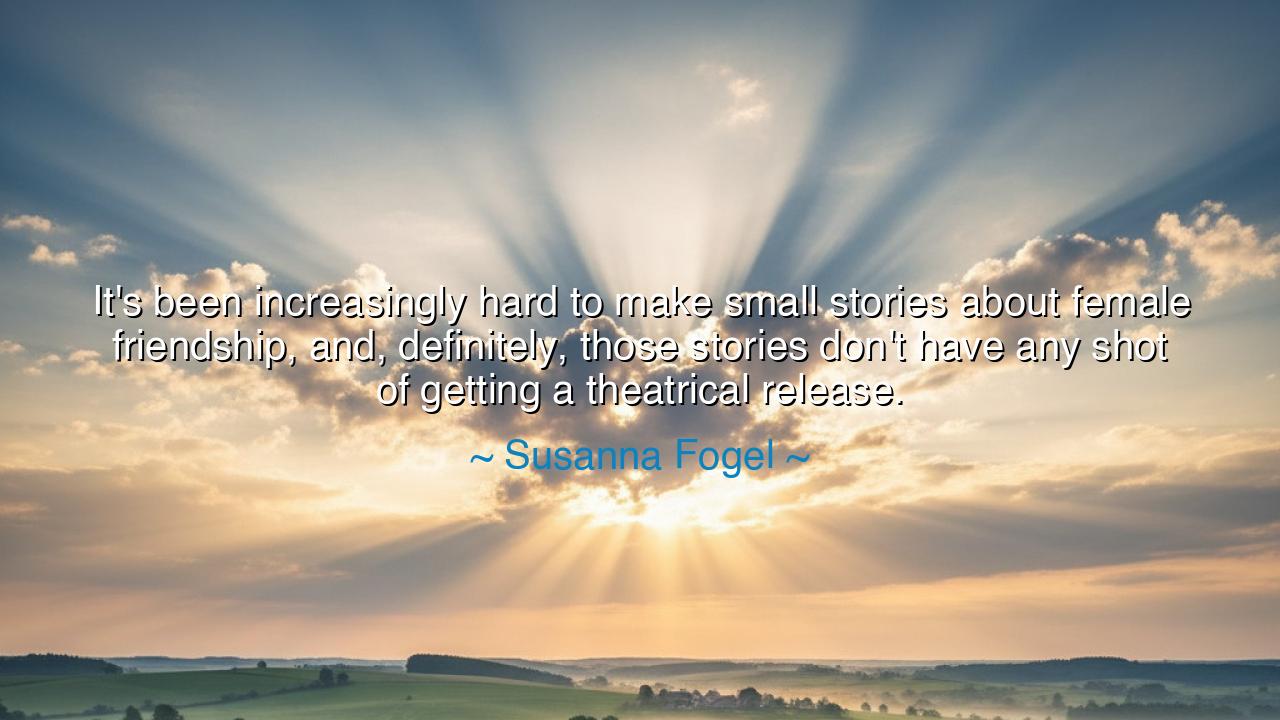
It's been increasingly hard to make small stories about female
It's been increasingly hard to make small stories about female friendship, and, definitely, those stories don't have any shot of getting a theatrical release.






In the distant corners of history, where the fires of wisdom burned brightest, stories were not merely told—they were lived. And among the most powerful tales were those of friendship, especially the sacred bond between women. These stories were woven into the very fabric of ancient societies. In the epics of the Greeks, the bonds between Athena and Artemis, or the unwavering friendship between Antigone and her sister Ismene, spoke of strength, loyalty, and love—virtues that transcended the mere constraints of time and place. Yet, in the words of Susanna Fogel, a modern storyteller, we hear a lament that echoes through the corridors of time: "It's been increasingly hard to make small stories about female friendship, and, definitely, those stories don't have any shot of getting a theatrical release." Her words, though spoken in the present age, strike at the heart of a timeless struggle—the struggle for the recognition of women’s voices in the world’s stories.
To understand the depth of Fogel’s sentiment, one must first grasp the power of small stories—the quiet, intimate moments that shape lives and, ultimately, history. In the grand tales of battles, kings, and empires, it is often the smallest of moments that shape the deepest truths. The quiet smile between two friends, the shared glance of understanding between women, the whispered words of encouragement—they carry a power far beyond that of grand speeches or fame. Women’s friendships have always been the foundation of personal strength and societal survival. But in this modern age, Fogel’s lament speaks to a deeper injustice, a silence imposed upon these intimate narratives, stifling them in favor of louder, more marketable stories.
The tragic irony lies in the fact that while women’s friendships have always been integral to the weaving of life’s richest tapestries, their stories have long been relegated to the margins. Consider the tale of Sappho, the ancient poetess whose words captured the love and longing between women in a way that no man had ever done. Yet her voice, though brilliant, was drowned out in the frenzy of male-dominated narratives. The same can be said for Virginia Woolf, whose works explored the intimate and complex bonds between women, yet often found her voice misunderstood or dismissed by the greater literary world. These women, like Fogel today, faced the invisible barriers that society has placed between the narratives of women and the stories deemed worthy of the stage.
Fogel’s words also reflect a more modern truth, one where the voices of women are still often silenced in favor of grand, marketable spectacles that offer the illusion of change, but which ultimately serve the same tired patriarchal structures. The theater, once a place for reflection and revelation, has become a space where only the most grandiose or sensationalized tales are allowed to shine. The quiet, reflective story of female friendship, with its nuances and intricacies, is seen as too subtle, too small to captivate the masses. It is a tragedy, for the small stories—the personal, the intimate, the quiet—are the ones that speak the loudest to the soul.
Yet, there is hope. For history, despite its many setbacks, has always borne witness to the resilience of those who seek to amplify the quiet voices of women. In every era, there have been those who have dared to tell the truths of women’s lives, even in the face of rejection and silence. Take, for example, the remarkable Frida Kahlo, whose art spoke of pain, beauty, and the fierce love between women, despite the prevailing winds of the male-dominated art world. Her works were once dismissed, but now they stand as testaments to the power of female friendship, love, and identity. Tales of women’s bonds will always have a place, though they may be ignored for a time, and in the end, they will be heard.
The lesson, then, for those of us who walk this earth today is clear: do not silence the quiet stories. In a world that often favors the loud and the grand, let us honor the small stories—the subtle friendships, the moments of connection that may seem insignificant but are, in truth, the lifeblood of human experience. It is in these moments that we find the greatest truths. To the young ones who listen: embrace these small bonds, for in them lies the strength to transform the world. Lift up the quiet voices, and honor the friendships that may not make headlines but that shape the very foundation of our societies.
In our own lives, we must create spaces where these friendships can flourish, where the stories of women’s bonds, no matter how small, can be told and celebrated. Just as Fogel speaks to the silencing of these stories in the world of theater, we must ensure that the stage of our lives is one where every voice—especially the quiet, intimate ones—is given the room to speak. For it is in these voices, these small stories, that the future will find its most powerful truths.






AAdministratorAdministrator
Welcome, honored guests. Please leave a comment, we will respond soon